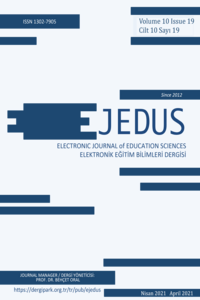MİKROORGANİZMA KAVRAMININ FARKLI ÖĞRENİM SEVİYELERİNDE ÖĞRENİLME DURUMUNUN ARAŞTIRILMASI
Bu araştırmanın amacı; ilkokul, ortaokul ve lise seviyelerinde öğrenim gören öğrencilerin mikroorganizma kavramını anlama düzeylerini ve mevcut kavram yanılgılarını belirlemektir. Bu araştırmada gelişimci araştırma yöntemi kullanılmıştır. Bu yöntem dahilin de veri toplama aracı olarak kavramsal anlama testi kullanılmıştır. Çalışmada kullanılan testte yazılı cevap gerektiren sorulara yer verilmiştir. Asıl uygulamadan önceki pilot çalışma 45 ile gerçekleştirilmiştir. Test ilkokuldan 35, ortaokuldan 35 ve liseden 35 öğrenci olmak üzere 105 öğrenciye uygulanmıştır. Testten elde edilen veriler mikroorganizma kavramıyla ilgili anlamaların farklı kategorilerde olduğunu ve bu kavramın her üç öğrenim seviyesindeki öğrenciler tarafından yeterince anlaşılamadığını göstermektedir. İlkokul seviyesindeki öğrenciler mikroorganizma kavramını günlük hayattaki kullanımı ile ilişkilendirirken, ortaokul ve lise öğrencileri ise açıklamalarında daha çok bilimsel tanım ve okul bilgisine bağlı kalmışlardır. Ayrıca, tüm öğrenim seviyelerinde bu kavramlarla ilgili kavram yanılgıları tespit edilmiştir.
AN INVESTIGATION INTO THE CONCEPTIONS OF MICROORGANISM AT DIFFERENT EDUCATIONAL LEVELS
This paper describes an investigation of the conceptions and misconceptions of microorganism held by students primary and secondary schools and students high schools. The study employed developmental research methodology. In order to collect the data, a conceptual understanding test were used. Before the main study, a pilot study was conducted with 45 students, thereby, some revisions could be done to improve the test's quality. A total of 105 students (35 from primary, 35 from secondary and 35 from high school) responded to the test, which consisted of questions that require written answers. The data from the test showed that the concept of was not fully understood by the students. Primary students with the use of microorganisms in daily life, while linking the concept, secondary and high school students in the more scientific definition description and schools have remained dependent on knowledge. Misconceptions have been determined at all levels of education. Implications for curriculum and school education are drawn from the results.
